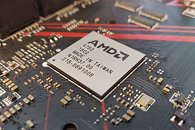Tuesday, September 24th 2019

Reported Specifications on AMD B550 Chipset Surface
We've known for some time that AMD's mainstream-segment B550 chipset wouldn't bring all the bangs and whistles of its bigger, enthusiast-class cousin X570. For one, it wouldn't make sense to increase development and implementation costs of both the chipset and motherboards built for mainstream enthusiasts by adding PCIe 4.0 support and the more stringent signaling and power requirements the new standard entails. As such, B550 reportedly cuts down fully on PCIe 4.0 support, as well as on the latest USB standards, to offer a product that's sufficiently rounded up on I/O while offering overclocking support for users that demand it.
Reportedly, AMD's B550 will only support up to 2x USB 3.2 Gen2 devices, 6x USB 2.0, 4 + 4 SATA3 connections, and the interlink between the chipset and the CPU occurs via a 4x PCIe 3.0 interface, which means there's less bandwidth for communication between the CPU and the chipset than on X570 - not that that was a real problem on AMD's previous-gen Ryzen products, though, so that's more of a technicality at this point. Ryzen 3000 CPUs still offer 4x PCIe 4.0 ports, though, so these could be used for speeding up a PCIe 4.0 NVMe SSD, for instance. The launch of B550-bound products is expected towards October.
Source:
Guru3D
Reportedly, AMD's B550 will only support up to 2x USB 3.2 Gen2 devices, 6x USB 2.0, 4 + 4 SATA3 connections, and the interlink between the chipset and the CPU occurs via a 4x PCIe 3.0 interface, which means there's less bandwidth for communication between the CPU and the chipset than on X570 - not that that was a real problem on AMD's previous-gen Ryzen products, though, so that's more of a technicality at this point. Ryzen 3000 CPUs still offer 4x PCIe 4.0 ports, though, so these could be used for speeding up a PCIe 4.0 NVMe SSD, for instance. The launch of B550-bound products is expected towards October.

26 Comments on Reported Specifications on AMD B550 Chipset Surface
something as simple as the faster m.2 slot might well be enough to convince a lot of people
The uplink between Ryzen 3000 and B550 is said to be the same 4 x PCIe 3.0 as has been for X370/X470/B450, which means that:
- the chipset is likely made by ASMedia
- the chipset uplink reserves lanes outside of the advertised 20 x 4.0 from the CPU, as it has been since the beginning of Ryzen, meaning you get an SSD and GPU's worth of lanes without having to cannibalize x16 for 4.0
- if the board vendors have at least three brain cells, you can run a single PCIe 4.0 SSD to draw out those remaining lanes from Ryzen 3000
- you won't be able to run more than 1 PCIe 4.0 SSD.
Which all sounds pretty good, and nothing out of line with what has been rumored previously. X570 already provides the support for multiple storage devices without bandwidth sharing, so why repeat that? I just want a passively cooled PCH for my SFF applications.
You guys are all forgetting that mini-ITX X570 boards are costing $200 USD at MSRP, pushing them north of $300 CAD over here, thanks to the active cooling and VRM choices of components. A nice ASMedia chip will allow most users to leverage 4.0 while pushing prices down a bit; X570 has been outright crazy.
Gunna be interesting to find out what the differences are, or if this is just a B450 rebadge (if so, wooo, no mobo upgrade for me!)
B550 boards should at least allow 4.0 x16 for GPU and 4.0 x 4 for one SSD, then 3.0 for the rest of them.
Unless AMD step up the game, give that B550 chipset 8 lanes PCIe Gen 3.0 ( that still way below X570 with it's 16 lanes PCIe Gen 4 so no one will bitching about fan ), but unlikely. So yeah, in the end this is just a re-badge B450 with USB 3.2 Gen 2 :shadedshu:
B450 was just a rebranding excercise. AMD had to add software incentives (StoreMi) just to provide some distinction between B350 and B450 on the comparison table, but there's nothing to stop you using other caching software on a B350. I'm not even sure StoreMi is the best option anyway, Linux users have better ZFS options, and Windows users won't get bitten by a motherboard change down the road if they use Windows tiered storage spaces instead.
Don't get me wrong though, there's nothing wrong with yet-another-rebrand for B550: Mainstream hardware requirements haven't really changed since B350 launched, so keeping the specs the same is fine too.
The last one will work in PCIe3 mode for B550, but the other two are still PCIe4, so unless AMD prevents it like with 3xx and 4xx motherboards, B550 motherboards will have PCIe4 gfx and NVMe just like X570 motherboards.
What will they cut to make their cheaper chipsets?
Seems messy, I'm curious if they just didn't mention that 5 Gbps ports are supported as well.
I'm honestly curious, how many devices that need a 10 Gbps USB do you use simultaneously?
That said, the rumor articles about B550 on TPU have been rather questionably written as of late. They seem to demonstrate among other things, that some of the TPU news crew cannot distinguish between PCIe offered by the CPU and those from the PCH, as well as how the AMD chipset uplink works.
I really hope AMD design this chipset to be maxed out, at least 16 lanes PCIe Gen 3.0 from PCH, then we will have
- 1 PCIe 3.0 x16
- 2 M.2 PCIe 3.0 x4
- 2 USB 3.2 , 4 USB 3.1, 6 USB 2.0
- 6 SATA.
..and that what I call decent upgrade :rolleyes:
The issue is when I want to plug in a fast USB stick or something, I'd rather not have to hunt for the right port.
As pointed above, there are two more USB 3.2 ports coming straight from the CPU, so it's not all bad (but these will 100% go to the back of your case, so you will have to hunt for them), but it's disheartening to see everything that's not USB 3.2 is downgraded straight to USB 2.0. X570 does the same, but with 12 USB 3.2 ports available, that's not an issue.
Considering some X570 boards even does this...
Or worst case, a USB hub.
Also, USB 3.2 is clearly very confusing. USB 3.2 Gen 1 is USB 3.0 (5Gbps) in terms of speed, USB 3.2 Gen 2 is USB 3.1 (10Gbps) in terms of speed and USB 3.2 Gen 2x2 is the "new" thing that does 20Gbps. The Ryzen 3000 has four native 10Gbps ports and so far, the X570 chipset supports an additional eight 10Gbps ports. There's no support for 20Gbps ports unless a PCIe connected host controller is used.
The B-series chipsets so far from AMD supports two 10Gbps ports and two 5Gbps ports, why this new chipset would support any less, is beyond me.
As such, systems with the alleged B550 chipset should support at least six 10Gbps ports.